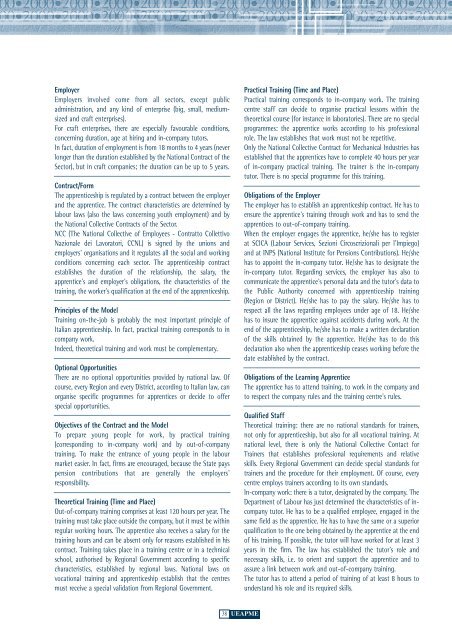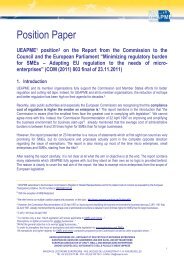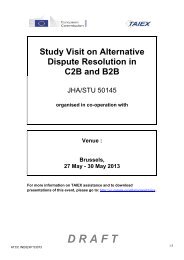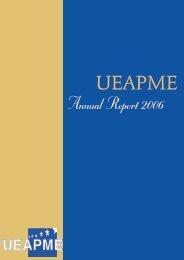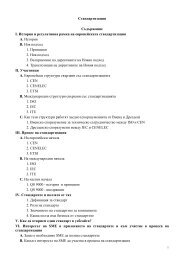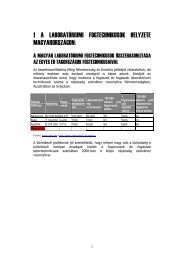Quality in Apprenticeship in the European Union - UEAPME
Quality in Apprenticeship in the European Union - UEAPME
Quality in Apprenticeship in the European Union - UEAPME
You also want an ePaper? Increase the reach of your titles
YUMPU automatically turns print PDFs into web optimized ePapers that Google loves.
Employer<br />
Employers <strong>in</strong>volved come from all sectors, except public<br />
adm<strong>in</strong>istration, and any k<strong>in</strong>d of enterprise (big, small, mediumsized<br />
and craft enterprises).<br />
For craft enterprises, <strong>the</strong>re are especially favourable conditions,<br />
concern<strong>in</strong>g duration, age at hir<strong>in</strong>g and <strong>in</strong>-company tutors.<br />
In fact, duration of employment is from 18 months to 4 years (never<br />
longer than <strong>the</strong> duration established by <strong>the</strong> National Contract of <strong>the</strong><br />
Sector), but <strong>in</strong> craft companies; <strong>the</strong> duration can be up to 5 years.<br />
Contract/Form<br />
The apprenticeship is regulated by a contract between <strong>the</strong> employer<br />
and <strong>the</strong> apprentice. The contract characteristics are determ<strong>in</strong>ed by<br />
labour laws (also <strong>the</strong> laws concern<strong>in</strong>g youth employment) and by<br />
<strong>the</strong> National Collective Contracts of <strong>the</strong> Sector.<br />
NCC (The National Collective of Employees - Contratto Collettivo<br />
Nazionale dei Lavoratori, CCNL) is signed by <strong>the</strong> unions and<br />
employers’ organisations and it regulates all <strong>the</strong> social and work<strong>in</strong>g<br />
conditions concern<strong>in</strong>g each sector. The apprenticeship contract<br />
establishes <strong>the</strong> duration of <strong>the</strong> relationship, <strong>the</strong> salary, <strong>the</strong><br />
apprentice’s and employer’s obligations, <strong>the</strong> characteristics of <strong>the</strong><br />
tra<strong>in</strong><strong>in</strong>g, <strong>the</strong> worker’s qualification at <strong>the</strong> end of <strong>the</strong> apprenticeship.<br />
Pr<strong>in</strong>ciples of <strong>the</strong> Model<br />
Tra<strong>in</strong><strong>in</strong>g on-<strong>the</strong>-job is probably <strong>the</strong> most important pr<strong>in</strong>ciple of<br />
Italian apprenticeship. In fact, practical tra<strong>in</strong><strong>in</strong>g corresponds to <strong>in</strong><br />
company work.<br />
Indeed, <strong>the</strong>oretical tra<strong>in</strong><strong>in</strong>g and work must be complementary.<br />
Optional Opportunities<br />
There are no optional opportunities provided by national law. Of<br />
course, every Region and every District, accord<strong>in</strong>g to Italian law, can<br />
organise specific programmes for apprentices or decide to offer<br />
special opportunities.<br />
Objectives of <strong>the</strong> Contract and <strong>the</strong> Model<br />
To prepare young people for work, by practical tra<strong>in</strong><strong>in</strong>g<br />
(correspond<strong>in</strong>g to <strong>in</strong>-company work) and by out-of-company<br />
tra<strong>in</strong><strong>in</strong>g. To make <strong>the</strong> entrance of young people <strong>in</strong> <strong>the</strong> labour<br />
market easier. In fact, firms are encouraged, because <strong>the</strong> State pays<br />
pension contributions that are generally <strong>the</strong> employers’<br />
responsibility.<br />
Theoretical Tra<strong>in</strong><strong>in</strong>g (Time and Place)<br />
Out-of-company tra<strong>in</strong><strong>in</strong>g comprises at least 120 hours per year. The<br />
tra<strong>in</strong><strong>in</strong>g must take place outside <strong>the</strong> company, but it must be with<strong>in</strong><br />
regular work<strong>in</strong>g hours. The apprentice also receives a salary for <strong>the</strong><br />
tra<strong>in</strong><strong>in</strong>g hours and can be absent only for reasons established <strong>in</strong> his<br />
contract. Tra<strong>in</strong><strong>in</strong>g takes place <strong>in</strong> a tra<strong>in</strong><strong>in</strong>g centre or <strong>in</strong> a technical<br />
school, authorised by Regional Government accord<strong>in</strong>g to specific<br />
characteristics, established by regional laws. National laws on<br />
vocational tra<strong>in</strong><strong>in</strong>g and apprenticeship establish that <strong>the</strong> centres<br />
must receive a special validation from Regional Government.<br />
Practical Tra<strong>in</strong><strong>in</strong>g (Time and Place)<br />
Practical tra<strong>in</strong><strong>in</strong>g corresponds to <strong>in</strong>-company work. The tra<strong>in</strong><strong>in</strong>g<br />
centre staff can decide to organise practical lessons with<strong>in</strong> <strong>the</strong><br />
<strong>the</strong>oretical course (for <strong>in</strong>stance <strong>in</strong> laboratories). There are no special<br />
programmes: <strong>the</strong> apprentice works accord<strong>in</strong>g to his professional<br />
role. The law establishes that work must not be repetitive.<br />
Only <strong>the</strong> National Collective Contract for Mechanical Industries has<br />
established that <strong>the</strong> apprentices have to complete 40 hours per year<br />
of <strong>in</strong>-company practical tra<strong>in</strong><strong>in</strong>g. The tra<strong>in</strong>er is <strong>the</strong> <strong>in</strong>-company<br />
tutor. There is no special programme for this tra<strong>in</strong><strong>in</strong>g.<br />
Obligations of <strong>the</strong> Employer<br />
The employer has to establish an apprenticeship contract. He has to<br />
ensure <strong>the</strong> apprentice’s tra<strong>in</strong><strong>in</strong>g through work and has to send <strong>the</strong><br />
apprentices to out-of-company tra<strong>in</strong><strong>in</strong>g.<br />
When <strong>the</strong> employer engages <strong>the</strong> apprentice, he/she has to register<br />
at SCICA (Labour Services, Sezioni Circoscrizionali per l’Impiego)<br />
and at INPS (National Institute for Pensions Contributions). He/she<br />
has to appo<strong>in</strong>t <strong>the</strong> <strong>in</strong>-company tutor. He/she has to designate <strong>the</strong><br />
<strong>in</strong>-company tutor. Regard<strong>in</strong>g services, <strong>the</strong> employer has also to<br />
communicate <strong>the</strong> apprentice’s personal data and <strong>the</strong> tutor’s data to<br />
<strong>the</strong> Public Authority concerned with apprenticeship tra<strong>in</strong><strong>in</strong>g<br />
(Region or District). He/she has to pay <strong>the</strong> salary. He/she has to<br />
respect all <strong>the</strong> laws regard<strong>in</strong>g employees under age of 18. He/she<br />
has to <strong>in</strong>sure <strong>the</strong> apprentice aga<strong>in</strong>st accidents dur<strong>in</strong>g work. At <strong>the</strong><br />
end of <strong>the</strong> apprenticeship, he/she has to make a written declaration<br />
of <strong>the</strong> skills obta<strong>in</strong>ed by <strong>the</strong> apprentice. He/she has to do this<br />
declaration also when <strong>the</strong> apprenticeship ceases work<strong>in</strong>g before <strong>the</strong><br />
date established by <strong>the</strong> contract.<br />
Obligations of <strong>the</strong> Learn<strong>in</strong>g Apprentice<br />
The apprentice has to attend tra<strong>in</strong><strong>in</strong>g, to work <strong>in</strong> <strong>the</strong> company and<br />
to respect <strong>the</strong> company rules and <strong>the</strong> tra<strong>in</strong><strong>in</strong>g centre’s rules.<br />
Qualified Staff<br />
Theoretical tra<strong>in</strong><strong>in</strong>g: <strong>the</strong>re are no national standards for tra<strong>in</strong>ers,<br />
not only for apprenticeship, but also for all vocational tra<strong>in</strong><strong>in</strong>g. At<br />
national level, <strong>the</strong>re is only <strong>the</strong> National Collective Contact for<br />
Tra<strong>in</strong>ers that establishes professional requirements and relative<br />
skills. Every Regional Government can decide special standards for<br />
tra<strong>in</strong>ers and <strong>the</strong> procedure for <strong>the</strong>ir employment. Of course, every<br />
centre employs tra<strong>in</strong>ers accord<strong>in</strong>g to its own standards.<br />
In-company work: <strong>the</strong>re is a tutor, designated by <strong>the</strong> company. The<br />
Department of Labour has just determ<strong>in</strong>ed <strong>the</strong> characteristics of <strong>in</strong>company<br />
tutor. He has to be a qualified employee, engaged <strong>in</strong> <strong>the</strong><br />
same field as <strong>the</strong> apprentice. He has to have <strong>the</strong> same or a superior<br />
qualification to <strong>the</strong> one be<strong>in</strong>g obta<strong>in</strong>ed by <strong>the</strong> apprentice at <strong>the</strong> end<br />
of his tra<strong>in</strong><strong>in</strong>g. If possible, <strong>the</strong> tutor will have worked for at least 3<br />
years <strong>in</strong> <strong>the</strong> firm. The law has established <strong>the</strong> tutor’s role and<br />
necessary skills, i.e. to orient and support <strong>the</strong> apprentice and to<br />
assure a l<strong>in</strong>k between work and out-of-company tra<strong>in</strong><strong>in</strong>g.<br />
The tutor has to attend a period of tra<strong>in</strong><strong>in</strong>g of at least 8 hours to<br />
understand his role and its required skills.<br />
38 <strong>UEAPME</strong>


